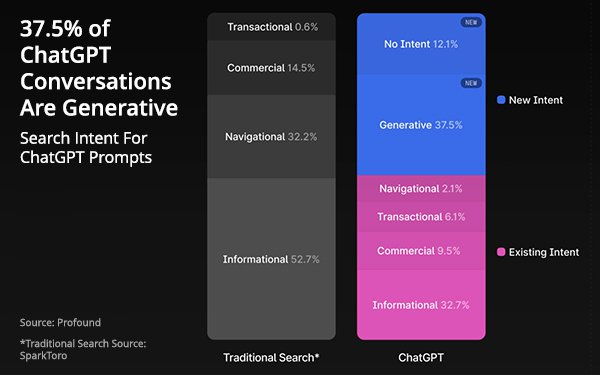
Traditional attribution models are broken.
When ChatGPT recommends HubSpot in a marketing budget breakdown without generating even one click, how do companies measure that influence?
The future no longer focuses on ranking in search
results. It's now about being cited and recommended by AI because more consumers are making purchases through AI chat, rather than clicking through to websites.
Transactional intent jumped
9x from 0.6% to 6.1% as a result of generative AI (GAI), according to Profound, an analytics company based in New York City that was founded in 2024.
Profound reported in a blog post
that it collected tens of millions of real ChatGPT user interactions and conversations from real users. It extracted and classified a sample of these chats, but it did not provide a timeline for when
it collected the data.
advertisement
advertisement
When users interact with AI chat models like ChatGPT, they skip discovery and navigation. Some 37% of all ChatGPT interactions are generative intent -- meaning they ask
for concrete output, “create X,” “draft Y,” and “do Z.”
People are asking ChatGPT to help them buy running shoes, for example, or find deals on software,
and procure consulting services.
Some 12% of prompts have no intent. Conversational words often include terms like "thanks" and "make it funnier," which represent a new user behavior
Profound is on a mission to help marketers and brands understand how their products appear and perform across the web as descriptions link to these GAI platforms.
Last week
Profound added Meta AI to the list of eight "answer engines." This followed a $20 million Series A funding round led by Kleiner Perkins with Khosla Ventures, NVIDIA
NVentures, Saga Ventures, South Park Commons, and SV Angel. Angel investors included Andrew Karam, cofounder of Applovin; among others like Kevin Wang, head of products
from Braze.
ChatGPT, Google AI Mode, Google AI Overviews, Google Gemini, Microsoft Copilot, Perplexity, and Grok are others that Profound now supports.
While the list of top
technology companies Profound supports keeps growing, recent data of more than 50 million ChatGPT prompts it analyzed shows web users who search online have been bypassing websites entirely, And,
traditional search engine optimization (SEO) strategies are failing.
Users are no longer looking for information. Instead they want GAI to create, draft, and complete tasks. Profound calls
it generative intent, and it dominates search queries at 37.5% market share.
The foundation of traditional SEO has shattered, according to Profound, with informational searches
plummeting from 53% to 33%.
Users no longer need to do separate searches to "go somewhere" to accomplish a task, showing that navigational intent searches have fallen from 32% to 2%.